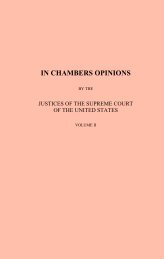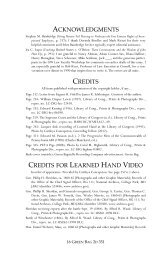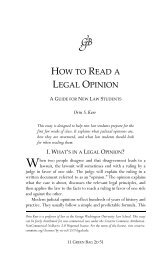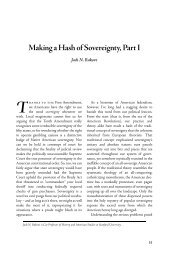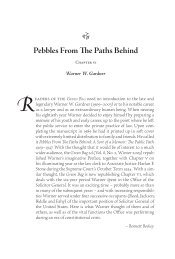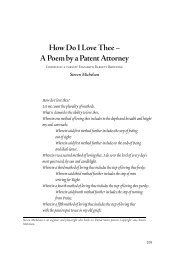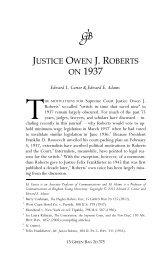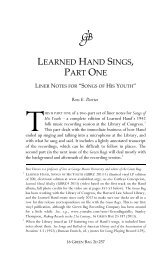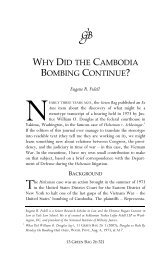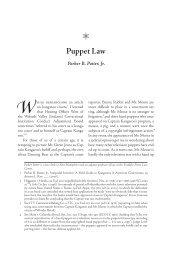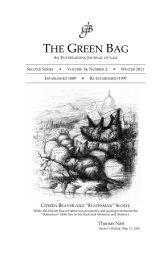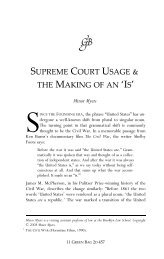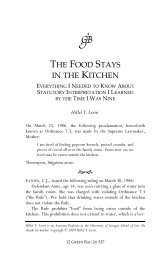FACTOIDS - The Green Bag
FACTOIDS - The Green Bag
FACTOIDS - The Green Bag
Create successful ePaper yourself
Turn your PDF publications into a flip-book with our unique Google optimized e-Paper software.
<strong>FACTOIDS</strong><br />
Allen Rostron †<br />
W<br />
HILE DOING RESEARCH on the First Amendment’s<br />
protection of commercial speech, I came across<br />
something in a federal district court opinion that<br />
made me pause. <strong>The</strong> case concerned a San Francisco<br />
ordinance that requires cell phone sellers to give their customers<br />
a sheet with information about the possibility that radio frequency<br />
energy emitted by cell phones could be dangerous. 1 Cell phone<br />
companies objected that this law violates their freedom of speech. In<br />
a crucial passage of the opinion, the judge described San Francisco’s<br />
warning sheet as containing a “series of factoids.” 2<br />
I had heard or read the word factoid before but never really had a<br />
reason to think about what it means. <strong>The</strong> gist of the judge’s opinion<br />
was that each of the statements on the warning sheet was true, when<br />
viewed in isolation, but together the statements added up to a misleading<br />
exaggeration of the risk posed by cell phones. For example,<br />
the warning sheet stated that the World Health Organization has<br />
classified radio frequency energy as a possible carcinogen, but it<br />
didn’t explain that scientific studies generally have found no link<br />
between cell phones and cancer. 3 A factoid, the opinion seemed to<br />
† Allen Rostron is the William R. Jacques Constitutional Law Scholar and Professor of Law,<br />
University of Missouri-Kansas City School of Law.<br />
1 See CTIA–<strong>The</strong> Wireless Ass’n v. City & Cty. of San Francisco, 827 F. Supp. 2d<br />
1054 (N.D. Cal. 2011), aff’d in part, vacated in part, and remanded, Nos. 11-17707,<br />
11-17773, 2012 WL 3900689 (9th Cir. Sept. 10, 2012).<br />
2 Id. at 1060.<br />
3 See id. at 1061.<br />
16 GREEN BAG 2D 43
Allen Rostron<br />
imply, is a fact that doesn’t tell the whole story or has been used<br />
without sufficient context.<br />
That seemed plausible. But still, I wondered, what exactly is the<br />
difference between a factoid and a fact? What puts the -oid in a factoid?<br />
I was intrigued enough to take a little detour in my research and<br />
try to find out more about the use of the word, especially in<br />
legal writing. I was surprised to find a more complex story than I had<br />
anticipated, as well as a dilemma for those who use the word now.<br />
While it is usually difficult to pinpoint exactly when and where a<br />
word was first used, factoid is an exception. <strong>The</strong> late, great Norman<br />
Mailer invented the term in his 1973 biography of Marilyn Monroe. 4<br />
He dismissed an earlier biography of the actress as “a book with facts<br />
embellished by factoids (to join the hungry ranks of those who coin a<br />
word).” 5 Mailer described factoids as “facts which have no existence<br />
before appearing in a magazine or newspaper, creations which are not<br />
so much lies as a product to manipulate emotion in the Silent Majority.”<br />
6 <strong>The</strong> word had a nice ring, and it made logical use of the suffix<br />
-oid, meaning “resembling” or “having the form or likeness of.” 7 Just<br />
as a humanoid is something less than human, and a planetoid is not<br />
quite a planet, a factoid resembles but falls short of being a fact.<br />
<strong>The</strong> word caught on. It was a neat way to describe things that<br />
seem to be facts but really are not. <strong>The</strong> best factoids get repeated so<br />
often that people become convinced they must be true. For example,<br />
the notion that the Great Wall of China is the only human creation<br />
that can be seen from the moon (or some say, from outer<br />
space) is one of the more “tenaciously incorrect” factoids. 8 It even<br />
slipped by the fact-checkers to appear on a Trivial Pursuit card. 9<br />
4 NORMAN MAILER, MARILYN: A BIOGRAPHY 18 (1973).<br />
5 Id.<br />
6 Id. Adding what was then a timely political jab, Mailer suggested that Richard<br />
Nixon may have “spoken in nothing but factoids during his public life.” Id.<br />
7 -oid, suffix, OXFORD ENGLISH DICTIONARY (online version Sept. 2012), www.oed<br />
.com/view/Entry/130874.<br />
8 See Great Walls of Liar, www.snopes.com/science/greatwall.asp (last visited<br />
Sept. 16, 2012).<br />
9 See <strong>The</strong> Great Wall of China, About.com, geography.about.com/od/specificplac<br />
44 16 GREEN BAG 2D
Factoids<br />
Like many factoids, it’s such a nifty bit of information that one can’t<br />
help thinking it ought to be true.<br />
<strong>The</strong> first use of the word that I have been able to find in legal<br />
writing came in 1980, when Victor Navasky reviewed Bob Woodward’s<br />
Supreme Court exposé <strong>The</strong> Brethren for the Yale Law Journal. 10<br />
A journalist and author as well as a Yale Law graduate, Navasky had<br />
just become the editor of <strong>The</strong> Nation, the weekly magazine of politics<br />
and culture for the American left, so it was not too surprising<br />
that he would be the one to import a new word from the literary<br />
world into the legal one. Navasky not only used the word factoid,<br />
but in keeping with law reviews’ fetish for footnotes, he included a<br />
citation crediting Mailer.<br />
<strong>The</strong> word appeared in a smattering of law review articles over<br />
the next decade. 11 Judges were slower to get in on the action, with<br />
the Sixth Circuit’s Danny Boggs breaking the judicial ice with a concurring<br />
opinion in an unpublished decision in 1993. 12 Sustaining a<br />
conviction for failure to file federal income tax returns, Judge Boggs<br />
referred to the litany of factoids embraced by tax protestors, such as<br />
the notion that wages are not really taxable income. Again, it was<br />
not at all surprising that Boggs would be the first judge to make use<br />
of an obscure word, as he is known for testing prospective law<br />
clerks’ knowledge of history, science, and literature with a very<br />
challenging trivia quiz. 13<br />
esofinterest/a/greatwall.htm (last visited Sept. 16, 2012). Many man-made objects,<br />
such as highways and cities, can be seen from low orbits of the earth; none<br />
can be seen from the moon. Id.<br />
10 Victor S. Navasky, <strong>The</strong> Selling of the Brethren, 89 YALE L.J. 1028, 1034 & n.28<br />
(1980) (reviewing BOB WOODWARD & SCOTT ARMSTRONG, THE BRETHREN:<br />
INSIDE THE SUPREME COURT (1979)).<br />
11 See, e.g., Mark V. Tushnet, Separation of Church and State: Historical Fact and Current<br />
Fiction, 45 LA. L. REV. 175, 175-76 (1984) (discussing the factoids used in a work<br />
of “crank constitutional law”); Mayer G. Freed & Daniel D. Polsby, <strong>The</strong> Doubtful<br />
Provenance of “Wood’s Rule” Revisited, 22 ARIZ. ST. L.J. 551, 552 (1990) (debunking<br />
a factoid about the origins of the doctrine of employment at will).<br />
12 United States v. Taylor, 991 F.2d 797 (Table), 1993 WL 94319, at *5 (6th Cir.<br />
1993) (Boggs, J., concurring).<br />
13 See Jonathan Kay, Dept. of Trivia: <strong>The</strong> Honorable Answer Man, NEW YORKER, May<br />
AUTUMN 2012 45
Allen Rostron<br />
As the word began to creep into legal circles, change was already<br />
afoot. While factoid originally meant something that was not true,<br />
people began using it to mean a nugget of information that is true but<br />
trivial or presented without adequate context. 14 This use of the word<br />
essentially treated -oid as if it were a diminutive suffix, like -let (as in<br />
booklet or piglet) or -ette (as in cigarette or kitchenette). Although it was<br />
a departure from the word’s original meaning, this new use seemed<br />
to fill a need for a pithy way to describe the blizzard of information<br />
fragments being churned out by new media formats and technologies.<br />
15 For example, after USA Today made its debut in 1982 and began<br />
to influence the style of other newspapers, critics latched onto<br />
factoid as a way to describe the new profusion of small bits of information.<br />
16 <strong>The</strong> advent of 24-hour television news channels also contributed<br />
to the phenomenon with their quick delivery of bite-sized<br />
news morsels. CNN Headline News even made factoids an explicit<br />
part of its programming, periodically flashing the word factoid on the<br />
screen followed by some interesting informational tidbit. 17<br />
<strong>The</strong> possibility for confusion arose, because factoid now could<br />
mean a widely believed falsehood or a trivial truth. What to do?<br />
M<br />
ef<br />
ichael Saks (then a law professor at Iowa; now at Arizona<br />
State) proposed a solution. In a 1992 article on empirical evidence<br />
about tort litigation, he drew a distinction between factoids<br />
14, 2001, at 49.<br />
14 PAUL BRIANS, COMMON ERRORS IN ENGLISH USAGE 79 (2003).<br />
15 See, e.g., Bernard E. Boland, <strong>The</strong> Future of Callings–An Interdisciplinary Summit on the<br />
Public Obligations of Professionals, 25 WILLIAM MITCHELL L. REV. 117, 127 (1999)<br />
(discussing how the Internet and television news provide “flashes of factoid and<br />
image without analysis”).<br />
16 See, e.g., Arthur D. Austin, Storytelling Deconstructed by Double Session, 46 U. MIAMI<br />
L. REV. 1155, 1159 (1992); David Shaw, More Color, Graphics; Newspapers Going for<br />
a New Look, L.A. TIMES, Mar. 13, 1986, at 1; Jonathan Yardley, A Paper for a<br />
U.S.A. on the Go, WASH. POST, Sept. 20, 1982, at C1.<br />
17 William Safire, On Language; Only the Factoids, N.Y. TIMES, Dec. 5, 1993, § 6, at<br />
32.<br />
46 16 GREEN BAG 2D
Factoids<br />
and factlets. 18 Citing Mailer’s original intent, Saks described a factoid<br />
as information that seems to be a fact but turns out, upon examination,<br />
to be either false or meaningless. 19 Saks used factlet, a<br />
seldom seen but not entirely unprecedented word, 20 to mean “bits<br />
or pieces of real information about the problem, pieces one may<br />
hope can be sewn together into a serviceable quilt, but which by<br />
themselves leave much more unknown than known.” 21 A year later,<br />
language guru William Safire endorsed essentially the same solution<br />
in his New York Times column, declaring that he would prefer factoid<br />
to be used only in its original sense but doubting whether that<br />
meaning could survive with “CNN Headline News, every day,<br />
pounding away with the ‘factlet’ sense.” 22<br />
Alas, factlet never caught fire, in legal writing or otherwise.<br />
While it does not appear to be headed for complete extinction, it<br />
shows up only once or twice a month in expansive news databases. 23<br />
It almost never appears in legal scholarship aside from occasional<br />
discussions of Professor Saks’ article, 24 and judges have never embraced<br />
it.<br />
Meanwhile, factoid has proliferated, and it is now rare to find the<br />
word used in its original sense. <strong>The</strong> word has a strong negative connotation<br />
in judicial opinions, but judges invariably use it to describe<br />
scattered fragments of fact rather than false information. For example,<br />
a court will condemn a party for relying on selected factoids<br />
18 Michael J. Saks, Do We Really Know Anything About the Behavior of the Tort Litigation<br />
System–And Why Not?, 140 U. PA. L. REV. 1147, 1162 (1992).<br />
19 Id.<br />
20 See, e.g., Janet Maslin, Excesses and Eccentrics, N.Y. TIMES, Jan. 20, 1985, § 7, at 9<br />
(criticizing a book for containing stale factlets).<br />
21 Saks, supra note 18, at 1162.<br />
22 Safire, supra note 17.<br />
23 For example, in the Lexis “News, All” file, factlet appeared in twenty items in<br />
2010 and ten items in 2011.<br />
24 For two exceptions, see Jonathan A. Bush, <strong>The</strong> Prehistory of Corporations and Conspiracy<br />
in International Criminal Law: What Nuremberg Really Said, 109 COLUM. L.<br />
REV. 1094, 1138 (2009), and Steven Lubet, Rumpled Truth on Trial, 94 NW. U. L.<br />
REV. 627, 630 (2000).<br />
AUTUMN 2012 47
Allen Rostron<br />
rather than comprehensively addressing the entire evidentiary picture,<br />
25 or a judge will declare that “it is not the place of a reviewing<br />
court to extract factoids from the record in an attempt to salvage a<br />
bad decision.” 26 In legal scholarship, the word’s meaning is often<br />
somewhat ambiguous, but the vast majority of uses involve trivial or<br />
uncontextualized facts rather than erroneous information. 27 One<br />
analyst, for example, recently condemned the U.S. Sentencing<br />
Commission for issuing a report that buried readers in factoids, but<br />
he clarified his meaning by adding that “[t]o say the report is full of<br />
‘factoids’ does not mean the numbers are false.” 28<br />
Language reference works, from the most venerable dictionaries<br />
29 to the trendiest compilations of new slang, 30 still typically list<br />
factoid’s original meaning as the primary or preferred definition. 31<br />
25 See Slick v. Reinecker, 839 A.2d 784, 790 (Md. Ct. Spec. App. 2003).<br />
26 Lett v. Renico, 507 F. Supp. 2d 777, 787 (E.D. Mich. 2007), aff’d, 316 F. App’x<br />
421 (6th Cir. 2009), rev’d, 130 S. Ct. 1855 (2010). Factoid made it all the way to<br />
the Supreme Court in Lett, as Justice Stevens quoted the district judge’s use of the<br />
term. See Renico v. Lett, 130 S. Ct. 1855, 1875 (2010) (Stevens, J., dissenting).<br />
27 <strong>The</strong> striking exception is David Kopel, a libertarian policy analyst who teaches<br />
constitutional law at the University of Denver and blogs for the Volokh Conspiracy.<br />
Kopel seems to be on a crusade to save factoid’s original meaning. See David B.<br />
Kopel, Mexico’s Federal Law of Firearms and Explosives, 13 ENGAGE: J. FEDERALIST<br />
SOC’Y PRAC. GROUPS 44, 47 (2012); David B. Kopel et al., How Many Global<br />
Deaths from Arms? Reasons to Question the 740,000 Factoid Being Used to Promote the<br />
Arms Trade Treaty, 5 N.Y.U. J. L. & LIBERTY 672, 673 (2010); David B. Kopel et<br />
al., Global Deaths from Firearms: Searching for Plausible Estimates, 8 TEX. REV. L. &<br />
POL. 113, 118 (2003); David B. Kopel, Guns, Gangs, and Preschools: Moving Beyond<br />
Conventional Solutions to Confront Juvenile Violence, 1 BARRY L. REV. 63, 63 (2000);<br />
David B. Kopel, Peril or Protection? <strong>The</strong> Risks and Benefits of Handgun Prohibition, 12<br />
ST. LOUIS U. PUB. L. REV. 285, 341 (1993).<br />
28 Paul J. Hofer, Review of the U.S. Sentencing Commission’s Report to Congress: Mandatory<br />
Minimum Penalties in the Federal Criminal Justice System, 24 FED. SENTENCING<br />
RPTR. 193, 195 (2012).<br />
29 See MERRIAM-WEBSTER’S COLLEGIATE DICTIONARY 448 (11th ed. 2003); factoid,<br />
n. and adj., OXFORD ENGLISH DICTIONARY (online version Sept. 2012), www.oed<br />
.com/view/Entry/67511.<br />
30 See Factoid, Urban Dictionary, www.urbandictionary.com/define.php?term=fact<br />
oid (last visited Sept. 16, 2012).<br />
31 See AMERICAN HERITAGE DICTIONARY OF THE ENGLISH LANGUAGE 632-33 (5th ed.<br />
48 16 GREEN BAG 2D
Factoids<br />
But in the court of popular usage, Norman Mailer’s vision has been<br />
trumped by that of CNN Headline News. As a result, writers now<br />
face the hoary dilemma of what to do when language evolves in<br />
ways that seem incorrect in some sense. Prescriptivists will condemn<br />
the widespread disregard for factoid’s original and more etymologically<br />
sound meaning, while descriptivists will tell us to accept<br />
that language is a living and adapting organism. 32 At least one usage<br />
guide advises writers simply to steer clear of the entire mess, declaring<br />
that “the definition of ‘factoid’ is hopelessly confused and it’s<br />
probably better to avoid using the term altogether.” 33<br />
I<br />
ef<br />
would hate to see the word factoid disappear entirely. And while I<br />
would cheer a comeback for its original meaning, I do not expect<br />
that to happen. <strong>The</strong> use of the word to mean an inconsequential bit<br />
of information has become too widespread and entrenched. At this<br />
point, the goal should be simply to avoid confusion, and the most<br />
feasible way to achieve that would be for writers to use factoid exclusively<br />
to mean snippets of fact that are trivial or taken out of context,<br />
while shifting to some other term to describe information that<br />
seems factual but really is not. I would suggest that pseudo-fact is a<br />
great candidate to take over the role that Mailer intended for factoid.<br />
While rarely seen in legal writing or elsewhere, pseudo-fact has been<br />
around for at least a century. 34 Its meaning should be readily understandable,<br />
even to those encountering it for the first time, given its<br />
logical use of the familiar pseudo- prefix. Any nervous lawyers need-<br />
2011) (reporting that only 43 percent of usage panel members approved using<br />
factoid to mean “a brief, somewhat interesting fact”).<br />
32 For a nice explanation of the prescriptivist/descriptivist battle lines, see Bryan A.<br />
Garner, Making Peace in the Language Wars, 7 GREEN BAG 2D 227 (2004), and Peter<br />
Tiersma, Language Wars Truce Accepted (With Conditions), 8 GREEN BAG 2D 281<br />
(2005).<br />
33 BRIANS, supra note 14, at 79.<br />
34 See pseudo-, comb. form, OXFORD ENGLISH DICTIONARY (online version Sept.<br />
2012), www.oed.com/view/Entry/153742.<br />
AUTUMN 2012 49
Allen Rostron<br />
ing a little reassurance that pseudo-fact is indeed a legitimate word<br />
can take comfort from the fact that Richard Posner, indisputably a<br />
Man of Letters (if not always a Fan of Dictionaries), 35 was responsible<br />
for what appears to be its inaugural judicial use. 36<br />
Factoid was a clever invention, a neologism for a concept in need<br />
of a name. But with apologies to Norman Mailer, I say the time has<br />
come for us to start separating our pseudo-facts from our factoids.<br />
35 See Richard A. Posner, <strong>The</strong> Spirit Killeth, But the Letter Giveth Life, NEW REPUBLIC,<br />
Sept. 13, 2012, at 18.<br />
36 See Bastanipour v. INS, 980 F.2d 1129, 1132 (7th Cir. 1992).<br />
50 16 GREEN BAG 2D



